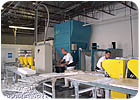
Mosaico Italiano of Pompano Beach, FL, specializes in the mass production of mosaics - catering to a high-end U.S. market.
Italy has always been at the forefront of new technology - particularly when it comes to developing new machinery and methods for producing high-quality stone products. For decades, Italians have been considered pioneers who have set the bar for top-of-the-line stone craftsmanship. And while growing up as part of this Italian culture, Massimo and Matteo Valcavi had the opportunity to learn the formula for running a state-of-the-art operation. So when the brothers moved to the U.S. with their family in the early 1980s, they continued to hone their skills and expand their knowledge of the industry. Four years ago, they graduated to the next step and opened their own manufacturing business, Mosaico Italiano in Pompano Beach, FL, which specializes in the commercial production of mosaics.
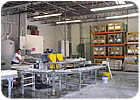
The manufacturing facility is equipped with two multi-blade Pragma machines, which produce between 900 and 1,000 feet of 5/8-inch mosaic pieces and about 700 units of molding per day.
“Our philosophy from the beginning was that we maintain a standard of quality as produced in Italy,†said Massimo Valcavi. “All of the products we use - paper, glue, mesh - come from Italy. This is for quality reasons, and also the philosophy of, 'If it works, don't fix it.'â€

Factory workers set the mosaic pieces on boards, which are then sent through a Pragma gluing machine.
Getting started
Massimo Valcavi went on to explain that the idea to start Mosaico Italiano initiated because of his experience as an exclusive U.S. agent. “We didn't see U.S. manufacturers using Pragma [machines],†he said. “They are very high tech. The machine we first bought was for heavy output.â€When the company first started, it was only doing service work for other area suppliers. It was cutting 24- x 24-inch tiles with its Pragma machine. After running the manufacturing facility like this for a while, the brothers soon realized the true potential of their company.
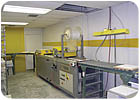
The gluing machine can produce approximately three pieces per minute.
As a result, Mosaico Italiano was developed with the strategy of targeting the high-end market in the U.S. “There was a niche that wasn't touched,†said Massimo Valcavi. “What makes us interesting is that a distributor from New York can call and say, 'We need 600 feet of a blend of three colors,' and we can supply it in a timely manner.â€
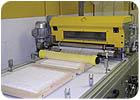
Mosaic pieces are glued with a sheet of mesh on top.
The shop operation
Mosaico Italiano's manufacturing facility includes a basic staff of 13 workers, with another six or seven who can step in for back-up shifts. For larger jobs, the factory can have as many as 25 workers. About 85% of the time its runs one eight-hour shift, but does increase to two shifts when necessary.The facility is equipped with two multi-blade Pragma machines. One has three cutting heads, which makes it ideal for producing moldings and cutting porcelain. It is also used to cut 5/8-inch mosaics because it ensures a clean cut, according to Massimo Valcavi. The second machine consists of two cutting heads. It is used to make “subway†tiles and larger mosaic pieces.

Each mesh-mounted tile cures for about 20 minutes before the extra mesh around the sides is trimmed, and then the tiles are packaged.
A smaller tumbler is used for pieces ranging from 5/8 to 1 ¼ inches in size. It can produce about 200 feet of tile every 45 minutes.
In a separate room within the 15,000-square-foot facility, a second mosaic operation is in place. Factory workers here set the mosaic pieces on boards, which are then sent through a Pragma gluing machine. The mosaic pieces are glued with a sheet of mesh on top. Each mesh-mounted tile cures for about 20 minutes before the extra mesh around the sides is trimmed, and then the tiles are packaged. The gluing machine can produce approximately four pieces per minute.
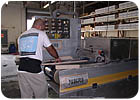
To maintain a high quality of standards, all of the cutters in the factory are technicians certified by Pragma, and they were all trained in Italy.
Fine-tuning the system
And while Mosaico Italiano now has a system in place to quickly and efficiently produce mosaics, it did require a little time to perfect it. “There definitely was a learning curve,†said Matteo Valcavi. “It would be naive to think that you start producing excellent mosaics right away. There was a lot of trial and error. It was not just getting the machines out of the box and start going. [But], the fact that all of the machines and materials are from Italy creates a little less worries.â€To maintain a high quality of standards, all of the cutters in the manufacturing facility are technicians certified by Pragma, and they were all trained in Italy. Additionally, Pragma technicians visit the company's factory about every six months to keep them up-to-date on new technology.
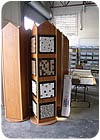
The company offers display and marketing programs to its 110 distributors, which are located throughout the U.S.
A total of 90% of Mosaico Italiano's products are field mosaics, while 10% is artistic mosaics. The company produces between 900 and 1,000 feet of 5/8-inch mosaic pieces a day, and an average of 700 units a day of molding.
The company maintains a stock of materials so that it can respond to customers quickly. “We have about 45 different colors that we offer, but really it could be limitless,†said Massimo Valcavi. The majority of the company's stone is imported directly from quarries around the world. The brothers' father, who opened his own distribution business in the Miami area when he and his family first moved to the U.S. from Italy, handles all of the imports for the company.

Mosaico Italiano introduced its new line of mosaics - featuring colored glass accent pieces, at Coverings last month.
He further explained that all of the stone that is imported has to meet the company's strict criteria. “All products are first-quality materials,†said Massimo Valcavi, explaining that all of the stone that is brought in comes from matching lots. “It is more expensive, but the product is really a lot better. We don't use scraps of marble.â€
While 60% of the tile used to make the mosaics arrives in a “broken†format - such as pieces with a chipped corner - the pieces are all calibrated. Additionally, Mosaico Italiano offers 12- x 12-inch tiles that match the mosaics. “The response has been very good,†said Matteo Valcavi. “Since we have it, and the customers are looking for it, it made sense. We want to be a one-stop shop for high-end mosaics.â€

The company has carved a niche for itself in the U.S. by being a leading supplier of mosaic floor tiles.
Marketing strategies
In addition to the factory workers and technicians, Mosaico Italiano employs an administrative staff of three and nine U.S. sales representatives, who cover a territory that runs from the Eastern Seaboard to California. The company also has a design department that translates designers' ideas into what is needed for production.To further promote its products and have them on the market nationwide, Mosaico Italiano has 110 dealers and distributors throughout the country. “We are very selective in choosing the right dealer,†said Matteo Valcavi. “We usually get between 15 to 20 dealer requests a week, and we only sign two or three. We are very brand/image conscious. We always say that these aren't cheap mosaics, and we want to make sure that they are presented in the right way. We go the extra mile and provide display and marketing programs for our dealers.â€
Another way that the company works to stay on top of the market is to continually research and develop new products. “Every three or four months, we want to come out with a new product line,†said Matteo Valcavi. “It keeps the dealers and designers happy, and allows the company to continue to grow. We want to originate ideas and keep them fresh.â€
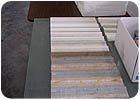
Among other products offered by the company are dual-tone moldings.
Also, the company values its contacts in Italy. “We can see if there is new technology that can be applied to new products,†said Matteo Valcavi.
Among some of the products recently introduced by Mosaico Italiano are subway tiles and dual-tone moldings. The molding pieces, which each feature two colors, were designed to match the company's mosaic lines. The company introduced a collection featuring mosaics accented by pieces of colored glass, at Coverings last month.
And while offering a wide selection of products is important to the success of Mosaico Italiano, the Valcavi brothers also believe that customer service is extremely important. “The factory is definitely the heart of [the company], but it is also the customer service,†said Matteo Valcavi. “A lot of times, people say that factories are very difficult to work with. We are very flexible. We want our customers to know that we are not just order takers. It goes beyond that. We are working with architects and designers - that communication is very important and helps us grow.â€
